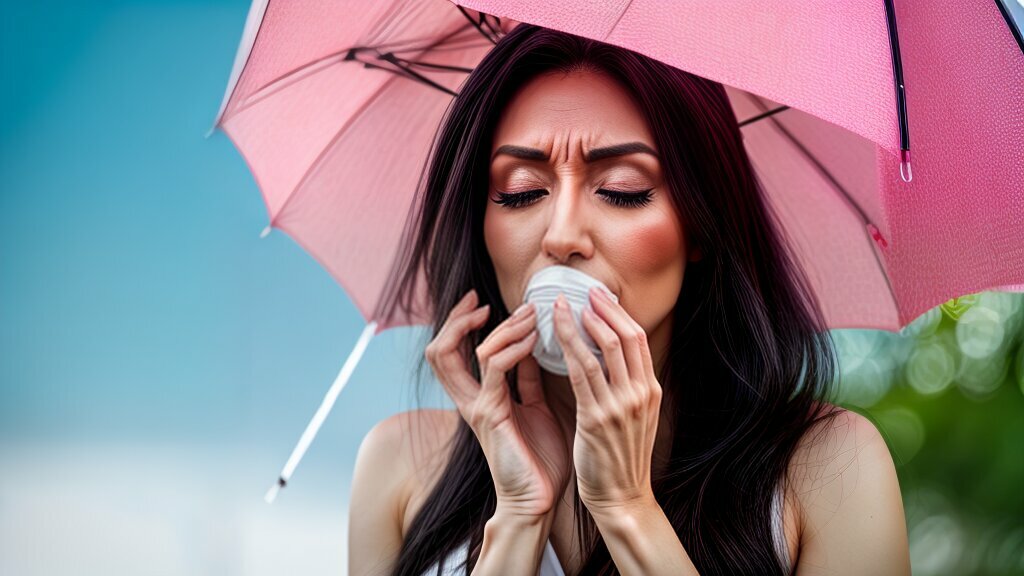If you suffer from allergies, you’re not alone. Allergies affect millions of people worldwide, and they can significantly impact your quality of life. Allergies occur when your immune system overreacts to a substance that is typically harmless. This substance is known as an allergen and can cause a range of symptoms, from mild to severe.
In this article, we will provide an overview of allergies, including their causes, symptoms, treatments, and prevention tips. We’ll also explore common allergens, discuss diagnosing allergies, and provide practical strategies for managing them at home.
Key Takeaways:
- Allergies occur when your immune system overreacts to a substance that is typically harmless.
- Allergies can significantly impact your quality of life.
- This article will provide an overview of allergies, including their causes, symptoms, treatments, and prevention tips.
- We’ll also explore common allergens, discuss diagnosing allergies, and provide practical strategies for managing them at home.
Understanding Allergies
If you experience symptoms such as sneezing, itchy eyes, and a runny nose, you may have allergies. Allergies occur when your immune system reacts to a substance, known as an allergen, as if it were harmful to your body, triggering a range of unpleasant symptoms.
Allergies can be caused by a variety of factors, including pollen, dust, animal dander, and certain foods. When you come into contact with an allergen, your body releases histamines, causing symptoms such as inflammation and itching.
Common symptoms of allergies include:
- Sneezing
- Runny or stuffy nose
- Itchy or watery eyes
- Rash or hives
- Shortness of breath or wheezing
If you suspect you have allergies, it’s important to see a doctor for a proper diagnosis. They may conduct a skin prick or blood test to identify the specific allergen causing your symptoms. Once you know what you’re allergic to, you can take steps to manage your allergy symptoms.

Fun fact: Did you know that allergies can develop at any age, even if you haven’t had symptoms before?
Common Allergens
If you’re one of the millions of Australians who suffer from allergies, you’re likely familiar with the various allergens that can trigger a reaction. It’s important to understand the different types of allergens and know how to avoid them to reduce the risk of experiencing allergy symptoms. Here are some of the most common allergens:
| Allergen | Symptoms |
|---|---|
| Pollen | Sneezing, runny nose, itchy eyes, congestion, fatigue |
| Food | Hives, swelling, itching, nausea, vomiting, diarrhea, anaphylaxis |
| Seasonal factors | Hay fever, asthma, sinusitis, ear infections |
| Dust | Sneezing, runny nose, itchy or red eyes, congestion, coughing |
| Pet dander | Sneezing, runny nose, itchy or red eyes, congestion, wheezing, shortness of breath |
It’s important to note that some people may be allergic to multiple allergens, making it difficult to identify the exact cause of their symptoms. If you suspect you’re allergic to certain substances, consult an allergist for testing and diagnosis.

Diagnosing Allergies
If you suspect that you have an allergy, it is essential to seek professional diagnosis to identify the specific allergen causing your symptoms. Diagnosing allergies involves various methods and tests, including:
- Skin prick test: A small amount of the suspected allergen is placed on your skin, and a tiny prick is made to allow the allergen to enter your skin. If you are allergic, a small bump or hive will appear.
- Blood test: This test measures your immune system’s response to specific allergens by checking for the presence of antibodies in your blood.
- Patch test: This test checks for allergic reactions to substances that often cause skin allergies, such as fragrances, metals, and rubber chemicals.
During your diagnosis, it is essential to provide detailed information about your symptoms and medical history to help your healthcare provider determine the best course of treatment. While over-the-counter medications may provide short-term relief, it is crucial to have an accurate diagnosis to address the underlying cause of your allergies and prevent severe allergic reactions.

If left undiagnosed and untreated, allergies can severely impact your quality of life. Seeking professional help is essential for effective diagnosis and management of allergies.
Treating Allergies
If you’re suffering from allergies, you’ll be pleased to know that there are various treatment options available that can help relieve your symptoms. The right approach for you will depend on the type and severity of your allergies, as well as your overall health and medical history.
One common treatment option is medication. Over-the-counter antihistamines, decongestants, and nasal corticosteroids can help relieve symptoms such as sneezing, runny nose, and congestion. Your doctor may also prescribe allergy shots or immunotherapy, which works by exposing you to small amounts of allergens over time to increase your tolerance and reduce symptoms.
In addition to medication, lifestyle changes can also play a crucial role in managing allergies. For example, reducing your exposure to allergens by keeping windows and doors closed during high pollen seasons, washing bedding frequently, and using air purifiers can all help minimize your symptoms.

Your diet can also impact your allergies. Some studies suggest that certain foods, such as those high in vitamin C and omega-3 fatty acids, can help reduce inflammation that leads to allergy symptoms. However, if you have food allergies, it’s important to avoid trigger foods and talk to your doctor about a safe, healthy diet plan.
Remember, effective allergy treatment often requires a combination of approaches. Work with your doctor to develop a personalized treatment plan that addresses your specific symptoms and needs.
Managing Allergies at Home
Dealing with allergies can be a daunting task, but with the right management techniques, you can minimize your symptoms and create a comfortable living space. Here are some tips to help you manage your allergies at home:
Reduce Exposure to Allergens
The first step in managing allergies is to reduce your exposure to allergens. Common allergens include pollen, dust mites, pet dander, and mold. Use an air purifier with HEPA filters to reduce the number of allergens in the air, especially in your bedroom. Wash your bedding regularly in hot water, and vacuum your carpets and furniture at least once a week. If you have pets, bathe them frequently and keep them off of furniture and out of your bedroom.
Create an Allergy-Friendly Environment
Another key to managing allergies is creating an allergy-friendly environment. Keep your windows closed during peak allergy season, and use an air conditioner instead. Choose hypoallergenic bedding and pillowcases, and use allergen-proof covers on your mattress and pillows. Declutter your home so that dust and mold cannot accumulate in hidden areas, and use a dehumidifier to reduce humidity levels in your home.
Use Natural Remedies
Some natural remedies can help alleviate allergy symptoms. Saline nasal sprays or rinses can help clear your nasal passages, and steam inhalation can help relieve congestion. Honey can provide relief for allergy-related throat irritation and coughing. However, be sure to check with your doctor before trying any natural remedies, as some may interfere with medications or other medical conditions.
Take Medications as Prescribed
If your allergies are severe, your doctor may prescribe medications to help manage your symptoms. These may include antihistamines, decongestants, or nasal corticosteroids. Be sure to take your medications as prescribed and inform your doctor if you are experiencing any adverse side effects.
By following these tips, you can effectively manage your allergies at home and reduce your symptoms. Remember to talk to your healthcare provider if you have any concerns or questions about your allergies.

Coping with Seasonal Allergies
Seasonal allergies can be a real hassle, making your life miserable during certain times of the year. To minimize your symptoms and enjoy the changing seasons more comfortably, it’s important to take precautions and be proactive.
The severity of your seasonal allergies depends on several factors, including the types of allergens you are sensitive to, the climate in your area, and your overall health. Common seasonal allergens include pollen from trees, grasses, and weeds, as well as mold spores that tend to be more prevalent in damp environments.
To cope with seasonal allergies, try these tips:
- Avoid outdoor activities during high pollen count days: Check your local weather forecast for pollen count levels, and try to stay indoors during peak times. If you need to go out, wear sunglasses and a hat to reduce exposure to pollen.
- Keep your windows closed: Use air conditioning during the summer to keep cool, but make sure your air filters are clean and free of dust and debris.
- Wash your hands and shower: After spending time outside, wash your hands and shower to remove pollen from your skin and hair.
If your seasonal allergies are severe, you may want to consider speaking with a healthcare provider about additional treatment options, such as allergy shots or prescription medications.

Remember, seasonal allergies don’t have to ruin your enjoyment of the changing seasons. By taking precautions and being proactive, you can minimize your symptoms and continue to enjoy all that nature has to offer.
Food Allergies: Causes and Management
If you experience symptoms such as hives, itching, or swelling after eating a certain food, you may have a food allergy. Food allergies occur when your immune system overreacts to specific proteins in food, triggering an allergic reaction.
Common food allergens include peanuts, tree nuts, shellfish, fish, soy, wheat, and milk. If you are allergic to a particular food, it is important to avoid it completely and read food labels carefully to check for any potential allergens.
If you suspect you have a food allergy, you should consult a healthcare provider for a proper diagnosis and individualized management plan.
| Allergy testing | Allergy management |
|---|---|
| There are several diagnostic tests that can help identify food allergies, including skin prick tests and blood tests. | Effective management of food allergies involves strict avoidance of the allergenic food and carrying epinephrine auto-injectors in case of accidental exposure. |
| Oral food challenges may also be used to confirm a diagnosis. | If you have a severe food allergy, it is important to inform those around you, such as friends, family, and co-workers, about your allergy and how to respond in case of an emergency. |

In some cases, cross-reactivity may occur, where your immune system reacts to proteins in foods that are similar to the allergenic food. For example, if you have a peanut allergy, you may also be allergic to other legumes such as soybeans.
Managing food allergies can be challenging, but there are strategies you can use to minimize your risk of exposure to allergens. These include:
- Reading food labels carefully when shopping and eating out
- Informing restaurant staff about your food allergy and asking about food preparation methods
- Avoiding foods that may contain hidden allergens, such as baked goods, sauces, and dressings
- Keeping your epinephrine auto-injector with you at all times
If you experience symptoms of a severe allergic reaction, seek emergency medical attention immediately.
Managing food allergies can be challenging, but with proper diagnosis and management, you can live a healthy and enjoyable life.
Seeking Professional Help
If your allergy symptoms are severe or you experience any type of allergic reaction, seeking professional help is crucial. Delaying or avoiding medical care can lead to potentially life-threatening outcomes, such as anaphylaxis.
If you are unsure of what is causing your symptoms or if your symptoms are not responding to over-the-counter medication, consult with your healthcare provider. They can perform tests to determine the specific allergen triggering your symptoms and recommend an appropriate treatment plan.
If you experience a severe allergic reaction, seek immediate medical attention. Symptoms of anaphylaxis include difficulty breathing, swelling of the face or throat, rapid heartbeat, and low blood pressure. Anaphylaxis requires immediate emergency medical treatment, such as an injection of epinephrine (adrenaline), to prevent potentially fatal outcomes.
Remember, it is always better to be safe than sorry when it comes to severe allergies and allergic reactions. Do not hesitate to seek professional help if you experience any concerning symptoms.

Conclusion
Congratulations! You now have a better understanding of allergies and how to manage them effectively. By identifying the causes and symptoms of allergies, you can take steps to prevent and reduce the severity of your symptoms. Remember to consult a healthcare provider if you experience severe allergic reactions, such as anaphylaxis.
Through proper diagnosis, treatment, and management, you can find relief from allergy symptoms and live a healthier life. Whether it’s seasonal allergies, food allergies, or other types of allergies, there are various options available to help you cope with and manage your symptoms.
Thank you for taking the time to read this article. We hope the information provided has been helpful and informative. Stay healthy and allergy-free!
FAQ
Q: What are allergies?
A: Allergies are an immune system response to certain substances, known as allergens, that the body perceives as harmful. When exposed to these allergens, the immune system releases histamines, leading to various symptoms.
Q: What are the common symptoms of allergies?
A: Common symptoms of allergies include sneezing, itching, runny nose, watery eyes, coughing, wheezing, hives, and swelling. In severe cases, allergies can cause difficulty breathing, chest tightness, and anaphylaxis.
Q: How can allergies be diagnosed?
A: Allergies can be diagnosed through various methods, including skin prick tests, blood tests, and elimination diets. These tests help identify specific allergens causing the symptoms.
Q: What are the available treatment options for allergies?
A: Treatment options for allergies include medication, such as antihistamines and nasal sprays, immunotherapy (allergy shots), and lifestyle changes to minimize exposure to allergens.
Q: What are some practical tips for managing allergies at home?
A: To manage allergies at home, it’s important to reduce exposure to allergens. This can be achieved by regularly cleaning and dusting, using allergen-proof bedding, keeping windows closed during high pollen seasons, and using an air purifier.
Q: How can seasonal allergies be coped with?
A: To cope with seasonal allergies, it’s helpful to monitor pollen counts, wear sunglasses and a hat when outdoors, avoid outdoor activities during peak pollen times, and consider using over-the-counter or prescribed allergy medications.
Q: What are food allergies and how can they be managed?
A: Food allergies occur when the immune system reacts to certain proteins in food. To manage food allergies, it’s crucial to read food labels carefully, avoid cross-contamination, carry emergency medication like epinephrine, and communicate dietary restrictions to others.
Q: When should professional help be sought for allergies?
A: Professional help should be sought for severe allergies and allergic reactions, such as anaphylaxis. It’s important to consult a healthcare provider if symptoms are severe, persistent, or affecting daily life.
